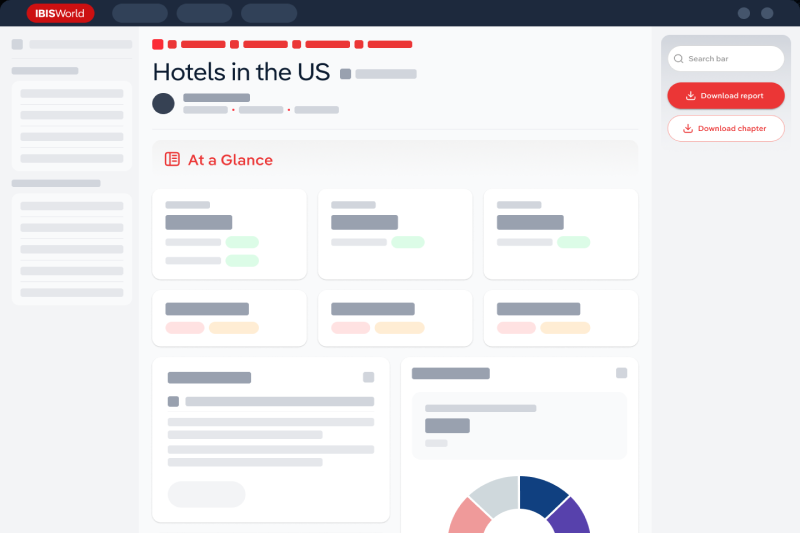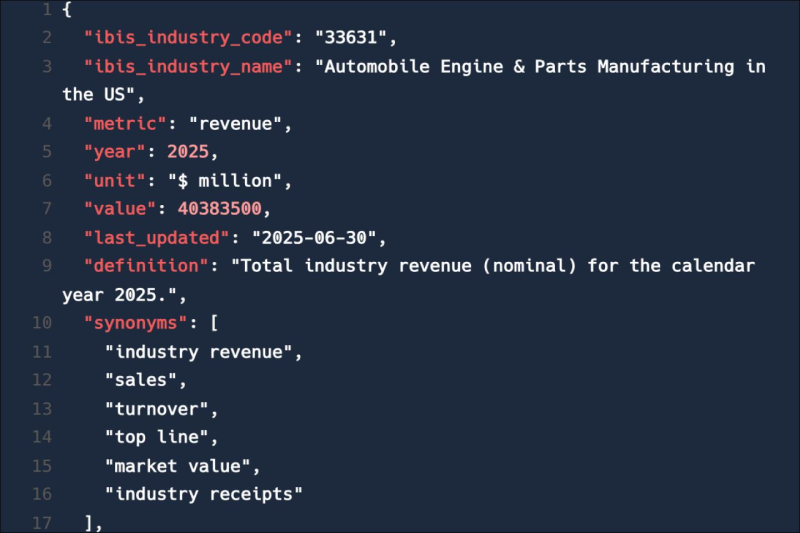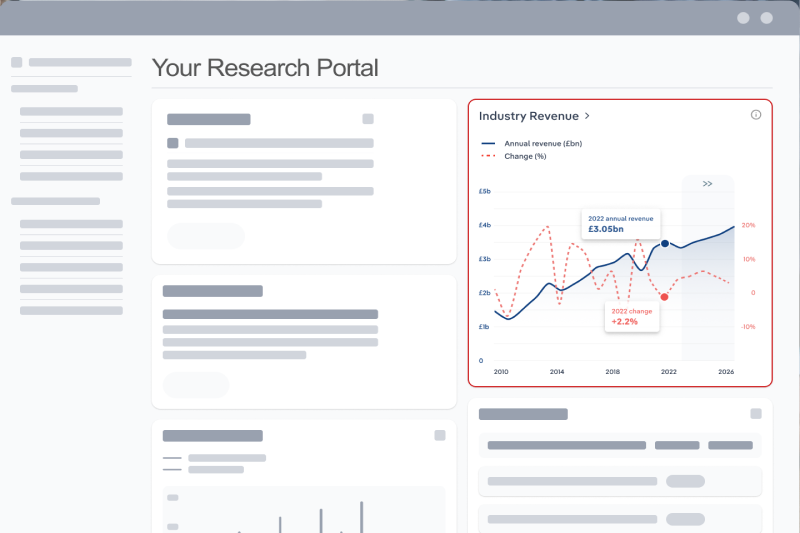IBISWorld Platform
Answer any industry question in minutes with our entire database at your fingertips.

Over the five years through 2024, revenue for the Copper Smelting industry in China has been growing at an annualized rate of 10.0% to $263.4 billion, including 6.1% growth in the current year. China is the world's largest consumer of copper, which has led to a widening trade gap in recent years. In 2024, 13.9% of domestic demand will be satisfied by imports, while only 1.0% of total industry revenue will be generated by exports. Higher raw material costs have constrained industry profitability. The industry profit margin is lower, being at 1.2% in 2024.Domestic economic growth and rising consumption levels provide significant support to the development of this industry. The performance of the global economy also affects the industry's performance, with foreign demand for China's exports influencing copper usage and volumes in many downstream products, like refrigerators and air-conditioners.Benefiting from wide application of downstream industries, the industry revenue is projected to grow at an annualized rate of 3.0% over the five years through 2029, to $305.2 billion.Global copper reserves are expected to be more concentrated within a few large-scale multinational mining companies, while merger activity among foreign copper miners will continue. These mergers will raise purchase costs for copper ores, and lower gross profit margins for domestic players, especially those that rely heavily on imported ores.The green transformation of the industry has become an inevitable trend, and the development of efficient and energy-saving technology and processes will become a key focus of the industry. In addition, with increasing labor cost and product manufacturing standards, many larger enterprises have accelerated production automation process and carried out intelligent manufacturing in order to reduce costs and improve profitability.

Answer any industry question in minutes with our entire database at your fingertips.

Feed trusted, human-driven industry intelligence straight into your platform.

Streamline your workflow with IBISWorld’s intelligence built into your toolkit.
IBISWorld's research coverage on the Copper Smelting industry in China includes market sizing, forecasting, data and analysis from 2014-2029. The most recent publication was released May 2024.
The Copper Smelting industry in China operates under the industry code 3311. The Copper Smelting industry in China extracts copper from copper ore or copper scrap by smelting, refining or electrolyzing. This industry also produces copper-based alloys during copper smelting. Related terms covered in the Copper Smelting industry in China include anode copper, cathode copper and copper concentrate.
Products and services covered in Copper Smelting industry in China include Cathode copper, Anode copper and Other products.
Companies covered in the Copper Smelting industry in China include Jiangxi Copper Company Limited, Tongling Nonferrous Metals Group Co., Ltd. and Yunnan Copper Co., Ltd.
The Performance chapter covers detailed analysis, datasets, detailed current performance, sources of volatility and an outlook with forecasts for the Copper Smelting industry in China.
Questions answered in this chapter include what's driving current industry performance, what influences industry volatility, how do successful businesses overcome volatility, what's driving the industry outlook. This analysis is supported with data and statistics on industry revenues, costs, profits, businesses and employees.
The Products and Markets chapter covers detailed product and service segmentation, analysis of major markets and international trade data for the for the Copper Smelting industry in China.
Questions answered in this chapter include how are the industry's products and services performing, what are innovations in industry products and services, what products or services do successful businesses offer and what's influencing demand from the industry's markets. This includes data and statistics on industry revenues by product and service segmentation and major markets.
The Geographic Breakdown chapter covers detailed analysis and datasets on regional performance of the Copper Smelting industry in China.
Questions answered in this chapter include where are industry businesses located and how do businesses use location to their advantage. This includes data and statistics on industry revenues by location.
The Competitive Forces chapter covers the concentration, barriers to entry and supplier and buyer profiles in the Copper Smelting industry in China. This includes data and statistics on industry market share concentration, barriers to entry, substitute products and buyer & supplier power.
Questions answered in this chapter include what impacts the industry's market share concentration, how do successful businesses handle concentration, what challenges do potential industry entrants face, how can potential entrants overcome barriers to entry, what are substitutes for industry services, how do successful businesses compete with substitutes and what power do buyers and suppliers have over the industry and how do successful businesses manage buyer & supplier power.
The Companies chapter covers Key Takeaways, Market Share and Companies in the Copper Smelting industry in China. This includes data and analysis on companies operating in the industry that hold a market share greater than 5%.
Questions answered in this chapter include what companies have a meaningful market share and how each company is performing.
The External Environment chapter covers Key Takeaways, External Drivers, Regulation & Policy and Assistance in the Copper Smelting industry in China. This includes data and statistics on factors impacting industry revenue such as economic indicators, regulation, policy and assistance programs.
Questions answered in this chapter include what demographic and macroeconomic factors impact the industry, what regulations impact the industry, what assistance is available to this industry.
The Financial Benchmarks chapter covers Key Takeaways, Cost Structure, Financial Ratios, Valuation Multiples and Key Ratios in the Copper Smelting industry in China. This includes financial data and statistics on industry performance including key cost inputs, profitability, key financial ratios and enterprise value multiples.
Questions answered in this chapter include what trends impact industry costs and how financial ratios have changed overtime.
The Industry Data chapter includes 10 years of historical data with 5 years of forecast data covering statistics like revenue, industry value add, establishments, enterprises, employment and wages in the Copper Smelting industry in China.
More than 6,000 businesses use IBISWorld to shape local and global economies
We were able to supplement our reports with IBISWorld’s information from both a qualitative and quantitative standpoint. All of our reporting now features some level of IBISWorld integration.

IBISWorld delivers the crisp business knowledge we need to drive our business. Whether it be serving up our major clients, winning new business or educating on industry issues, IBISWorld brings real value.

IBISWorld has revolutionised business information — which has proved commercially invaluable to exporters, investors and public policy professionals in Australia and overseas.

When you’re able to speak to clients and be knowledgeable about what they do and the state that they operate in, they’re going to trust you a lot more.

The market size of the Copper Smelting industry in China is $263.4bn in 2026.
There are 202 businesses in the Copper Smelting industry in China, which has declined at a CAGR of 0.8 % between 2019 and 2024.
The Copper Smelting industry in China is likely to be impacted by import tariffs with imports accounting for a moderate share of industry revenue.
The Copper Smelting industry in China is unlikely to be materially impacted by export tariffs with exports accounting for a low share of industry revenue.
The market size of the Copper Smelting industry in China has been growing at a CAGR of 10.0 % between 2019 and 2024.
Over the next five years, the Copper Smelting industry in China is expected to grow.
The biggest companies operating in the Copper Smelting industry in China are Jiangxi Copper Company Limited, Tongling Nonferrous Metals Group Co., Ltd. and Yunnan Copper Co., Ltd.
Cathode copper and Anode copper are part of the Copper Smelting industry in China.
The company holding the most market share in the Copper Smelting industry in China is Jiangxi Copper Company Limited.
The level of competition is low and increasing in the Copper Smelting industry in China.




